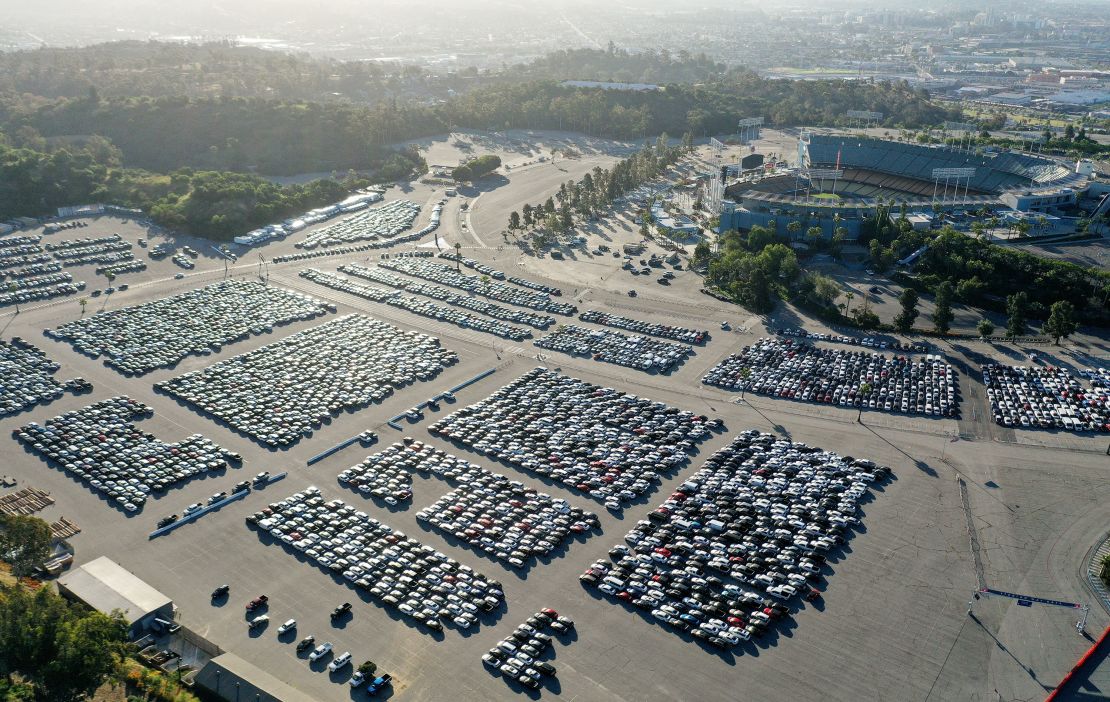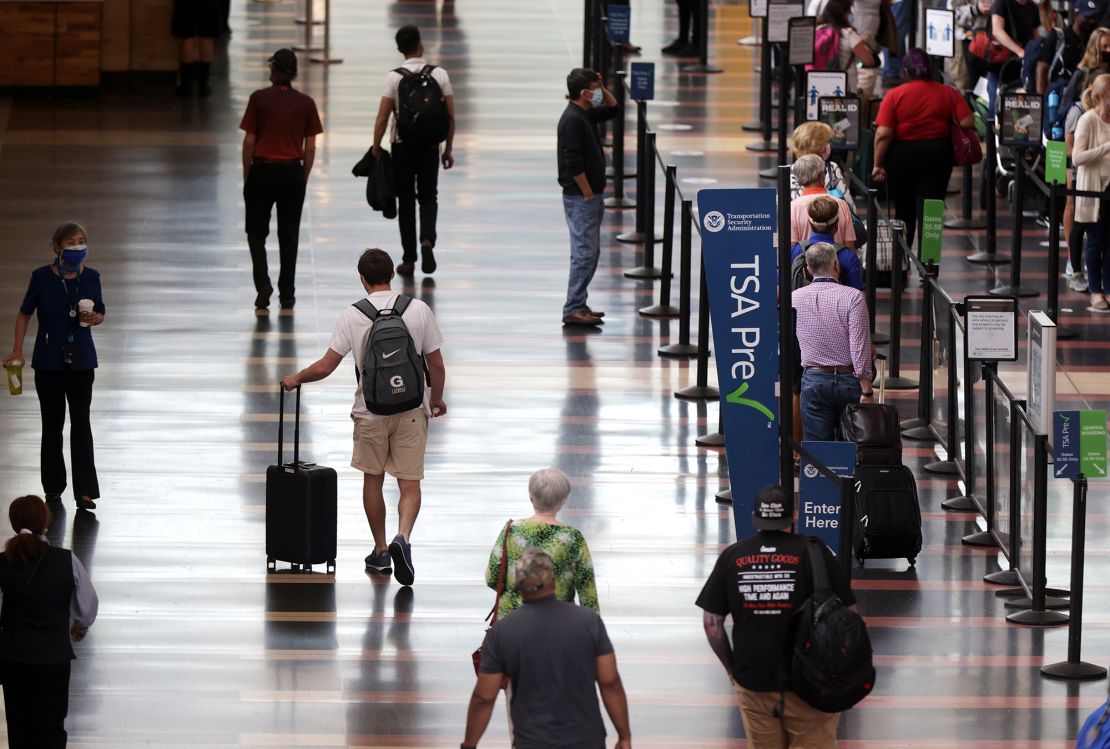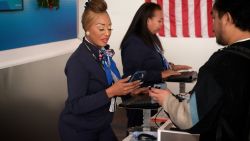Travel this long holiday weekend will be busy – and not only by pandemic standards.
Experts expect it will rival the busiest Independence Day weekend of the pre-coronavirus era. Lines at airports and jams on the highways will be back with a vengeance, they say.
AAA forecasts a record number of Americans are taking to the increasingly busy roads this weekend, and warns they will encounter the most expensive July 4 gas in seven years. America’s airports haven’t been this busy in more than a year, and some airlines are struggling to keep up with the demand.
With crowds at the airports and cars on the highways, this weekend is expected to look similar to the times before the pandemic rocked the industry.
But reminders of the pandemic remain: Face masks are still required for all passengers – even vaccinated ones – on all public forms of transportation, including airplanes, trains and buses, and in hubs like rail stations and airports. Restrictions prevent or complicate international travel to many countries. Cruises are just restarting with some onboard changes. And while airlines are back to selling middle seats, many have not yet returned full alcohol service.
“Even our regular fliers are sort of first-time fliers at this point,” Sara Nelson, president of the Association of Flight Attendants-CWA, told CNN.
Road trips are more popular than ever
The 47.7 million Americans that AAA forecasts will travel more than 50 miles between Thursday and Monday rivals the record-setting 2019 figure of 48.9 million.
The number of vacationers packing the car for a road trip, AAA expects, will be the largest ever: 43.6 million.
That means roads in vacation hot spots will see an even larger influx of traffic.
The transportation data firm Inrix says many cities – from New York to Los Angeles – are experiencing less traffic than usual this time of year, as many workers continue to sign in from home. Washington, D.C. traffic is 13 percentage points below usual, and San Francisco is down 21 percentage points. Both numbers are still higher than this time in 2020, when only 34.2 million people hit the road, AAA said.
But the story is different in the nation’s tourist hubs. Nine cities in Florida – including Tampa and Orlando – are seeing more traffic than usual.

“This is going to be a robust travel season,” said AAA spokesman Andrew Gross.
Among the factors causing families to take road trips, Gross said, is protecting unvaccinated children from crowded planes or trains, and high demand for rental cars in places they might have looked at for flights. Rental car companies that downsized fleets when demand dropped during the pandemic are now short on supply. That has driven a spike in rental prices – when there are cars to be had.
Gas prices are also climbing, and the national average of $3.12 on Thursday is the most expensive since reaching $3.66 in 2014. Prices at the pump reflect not only the demand for fuel, but the challenge to get it delivered to gas stations around the country. Some stations may run out, AAA says.
“It’s not that we have a gas supply issue in this country,” Gross said. “There just are not enough gas tank drivers available, because during the pandemic, there weren’t a lot of deliveries, so these drivers – highly in demand – they went off and found other jobs.”
The unruly skies
Air travel at some vacation hot spots – such as Nashville and Myrtle Beach, South Carolina – is already exceeding pre-pandemic levels, the Transportation Security Administration said Thursday. Officials launched a campaign to hire 6,000 workers, and the agency said it will continue staffing up through Labor Day.
July 4 travel kicked off with one of the busiest days at airports in 16 months.
The TSA reported screening 2,147,090 passengers on Thursday. That number fell just short of the record-setting 2.17 million screened last Sunday. TSA said it expects that record “to be outpaced over the holiday weekend.”
As passenger numbers climb, so do reports of passengers refusing to follow crew instructions, or even turning violent.
The Federal Aviation Administration has received more than 3,200 reports of unruly passengers this year, and opened 491 investigations. On average over the last 15 years, FAA has opened about 180 investigations annually, and officials say the number of reports filed was never large enough to warrant tallying.
“Now the public is coming back and getting out and treating flight attendants as punching bags, and they’re doing that verbally and physically,” said Nelson of the flight attendant union.
“Conflict is rising very quickly,” she added. “Everyone’s at a stress level 10. Everyone needs a little help right now and we’re asking everyone be a helper.”
Airlines that faced an uncertain future last summer are seeing passengers return in droves. United Airlines told CNN that even with business and international travel depressed, Thursday is the busiest travel day it has seen since the pandemic began.
“Leisure demand is more than 100%,” United CEO Scott Kirby told CNN. “The recovery indicates the huge desire for people to get back to living life.”

Packed planes
Planes are nearly full. Ultra-low-cost carriers, which specialize in shuttling people to vacation destinations, expect to see “load factors in the 90s,” said Chris Brown, a vice president at the National Air Carriers Association.
Airlines for America, representing the largest US airlines, said flights were 89% full last week – compared to 90% in the same week of 2019.
Some of the return is driven by passengers using flight credits from trips canceled during the pandemic.
Southwest Airlines and American Airlines said their schedules and staffing have been thrown off by the growing demand and weather. Data from the aviation website FlightAware show Southwest canceled or delayed 39,728 flights last month – the most of any US airline. The data showed American canceled or delayed 36,714 flights.
Southwest has pleaded with flight attendants to pick up extra trips and offered twice the usual pay. It said in a memo obtained by CNN that “adverse weather conditions” have put crews out of position for the next flight, and it said fewer flights between cities has made it harder to reposition crew members.
“If you are healthy and it is safe to do so, please help your fellow Cohearts by picking up available shifts,” wrote Southwest executive vice president Alan Kasher.
American said it would preemptively trim 1% of flights from its schedule through mid-July, citing bad weather and staffing shortages. The advance changes mean “impacting the fewest number of customers” and rebooking them.
Travelers taking the train instead will see more service from Amtrak. It recently began running more trains up and down the East coast and restored pre-pandemic service to dining on long distance routes in the West.
No matter how travelers head out, they should pack their patience, experts say.
“You’re going to have a lot of company on the road and in the skies and around you at all times,” said Gross, of AAA. “So just expect it won’t always be the smoothest, but you’re going to get there and you’re going to have fun.”













